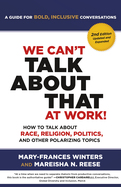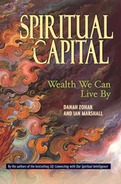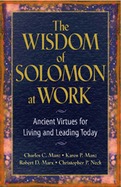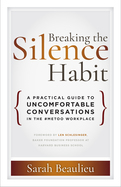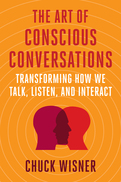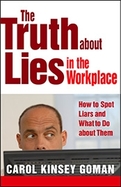Politics, religion, race-we can't talk about topics like these at work, right? But in fact, these conversations are happening all the time, either in real life or virtually. And if they aren't handled effectively, they can become more polarizing and divisive, impacting productivity, engagement, retention, teamwork, and even employees' sense of safety in the workplace.
In this second edition of We Can't Talk about That at Work!, best-selling author Mary-Frances Winters and new coauthor Mareisha N. Reese of The Winters Group, Inc., provide fresh examples, updated research, and compelling insights. Featuring a new chapter on how two organizations have actualized the model for Bold, Inclusive Conversations as well as a discussion guide and updated glossary, this modern classic offers step-by-step guidance for conducting structured conversations around polarizing topics. Leaders and organizations can address sensitive subjects head on in a way that brings people together instead of driving them apart.
2004
-
Provides a radical new philosophy for business that redefines its meaning and purpose and offers hope for a more sustainable future
-
Takes the concept of spiritual intelligence, pioneered in the authors' bestselling SQ: Connecting with Our Spiritual Intelligence, and applies it to the business world
The Wisdom of Solomon at Work offers stories about work and relationships that inspire us to look beyond ourselves as we serve and lead. Delving into that deep quarry of ageless truths, the Hebrew Bible (Old Testament), the authors open up a rich source of experience, insight, and wisdom that can be used to help us cope with the problems of modern life.
The dramatic stories of Job, Moses, Ruth, David, and Solomon contain universal lessons that everyone-regardless of their faith heritage-can appreciate and use to find wisdom to work and live by. The authors explore the dilemmas faced by these extraordinary figures, discuss how they resolved them, and then apply the same principles to a variety of specific contemporary problems. The authors use examples of people from all walks of life, both well-known and unknown, to show how the virtues taught in the Old Testament can be applied in our lives today.
The Wisdom of Solomon at Work illuminates the abiding virtues-faith, courage, compassion, integrity, and justice-that then and now equip us to meet life's challenges. It illustrates how spiritual wisdom can be woven into the fabric of everyday life, informing and improving everything we do.
- Provides a fresh, contemporary perspective on the timeless wisdom of the Old Testament
- Uses personal stories to show how people today are reconciling spiritual values with the pressures of modern life
- Shows that wisdom is something which can be cultivated by everyone
- By the author of the bestselling Leadership Wisdom of Jesus
In the wake of the #MeToo movement, employees and leaders are struggling with how to respond to the pervasiveness of sexual harassment. Most approaches simply emphasize knowing and complying with existing laws. But people need more than lists of dos and don'ts—they need to learn how to navigate this uncertain, emotionally charged terrain. Sarah Beaulieu provides a new skills-based approach to addressing sexual harassment prevention and response in the workplace, including using underdeveloped skills like empathy, situational awareness, boundary setting, and intervention.
Beaulieu outlines a five-part framework for having conversations about sexual harassment: Know the Facts; Feel Uncomfortable; Get Curious, Not Furious; See the Whole Picture; and Embrace Practical Questions. By embracing these conversations, we can break the cycle of avoidance and silence that makes our lives and workplaces feel volatile and unsafe. Grounded in storytelling, humor, and dozens of real-life scenarios, this book introduces the idea of uncomfortable conversation as the core skill required to enable everyone to bring their full talent and contributions to safe and respectful workplaces.
We live in conversations like fish live in water-we're in them all the time, so we don't think about them much. As a result, we often find ourselves stuck in cyclical patterns of unproductive behaviors. We listen half-heartedly, react emotionally, and respond habitually, like we're on autopilot.
This book is a practical guide for thoughtfully reflecting on conversations so we can avoid the common pitfalls that cause our relationships and work to go sideways. Chuck Wisner identifies four universal types of conversations and offers specific advice on maximizing the effectiveness of each:
Storytelling-Investigate the stories we tell ourselves about ourselves and others
Collaborative-Explore the way our stories and other people's stories interact
Creative-See new possibilities and discover unforeseen solutions
Commitment-Make promises we know we can keep
These conversations unfold sequentially: our awareness of our and others' stories transforms our ability to listen and collaborate, which opens our thoughts to creative possibilities, guiding us toward mindful agreements.
Our conversations-at home, at work, or in public-can be sources of pleasure and stepping-stones toward success, or they can cause pain and lead to failure. Wisner shows how we can form a connection from the very first conversation and keep our discourse positive and productive throughout any endeavor.
It's critical to catch workplace lies before they snowball into something catastrophic, but most of us have no clue about how to spot a liar.
You Work with a Bunch of Liars—Learn What to Do About It Sure, everyone tells little white lies now and then, but real deception in the workplace is a poison that can destroy relationships, careers, and companies. Carol Kinsey Goman, a leading workplace body language expert, combines her own experiences with the latest research to identify fifty subtle physical and vocal cues that will enable you to spot destructive workplace lies. She analyzes the role we play in supporting lies—how our own vanities, desires, self-deceptions, and rationalizations allow us to be duped. And once you detect a lie, she provides tactical advice on how to respond, whether the liar is above, below, or on the same level as you—even if it’s your boss. “Lying in the workplace causes huge problems for business—the proper people do not get promoted, profits are generally compromised, wrong steps are made, and much more. This book should be a best seller.” —Robert L. Dilenschneider, President and CEO, The Dilenschneider Group, and author of Power and Influence and A Briefing for Leaders “After 30 years in the training and development industry, I have come to trust Goman’s expertise in body language and nonverbal cues in the workplace. I would recommend this book to any leader working to improve culture and effective communication within his or her organization.” —Margie Mauldin, President, Executive Forum “Goman’s book sheds light on a phenomenon in business that too many of us prefer to [pretend] doesn't exist: deception. A must-read for emerging and established leaders alike.” —JD Schramm, EdD, Director, Mastery in Communication Initiative, Stanford University Graduate School of Business


